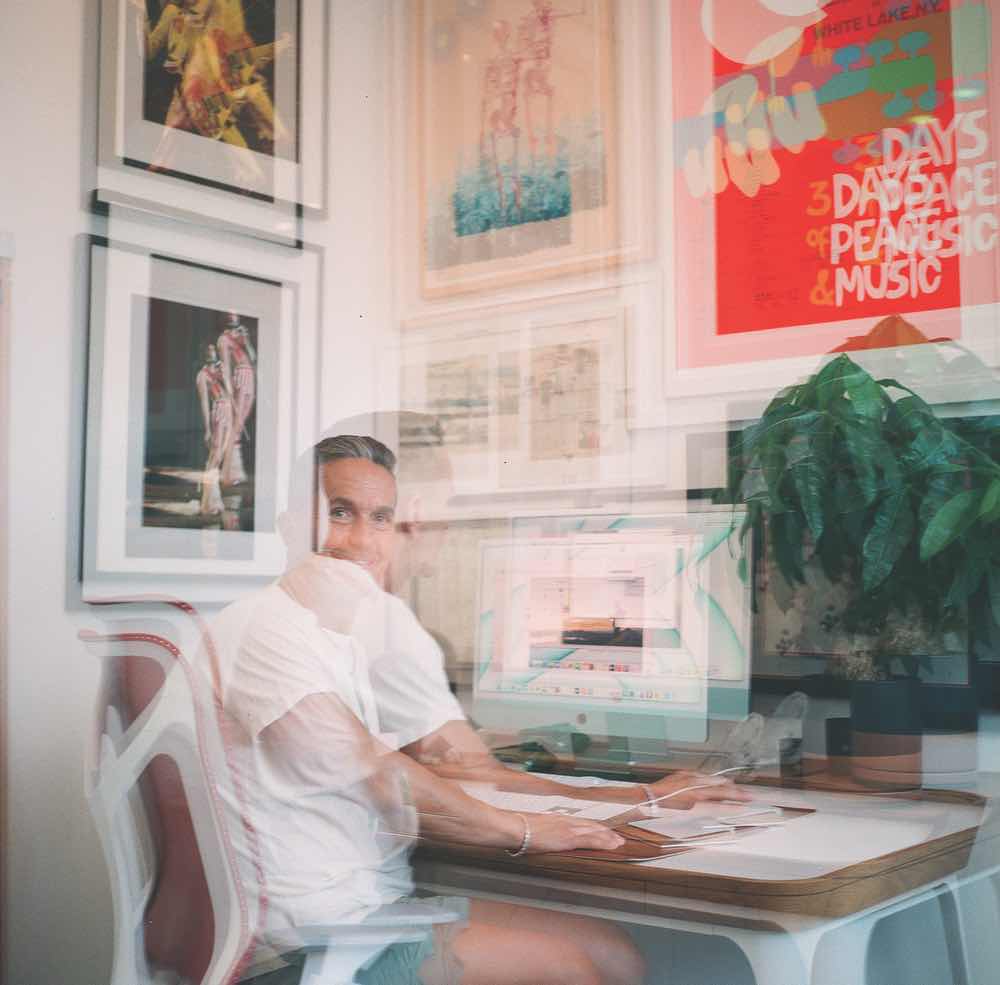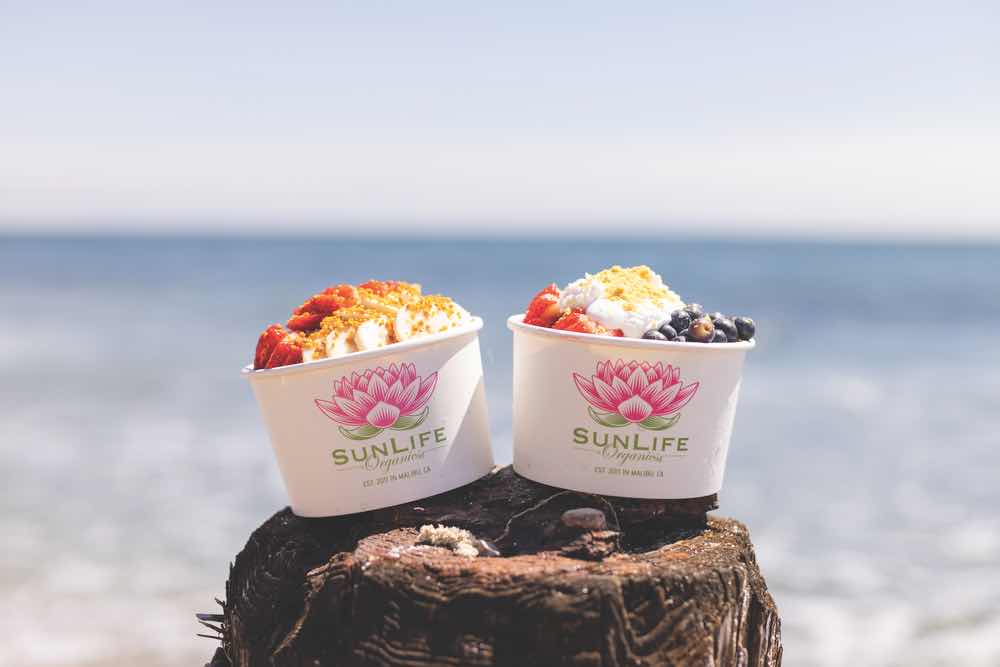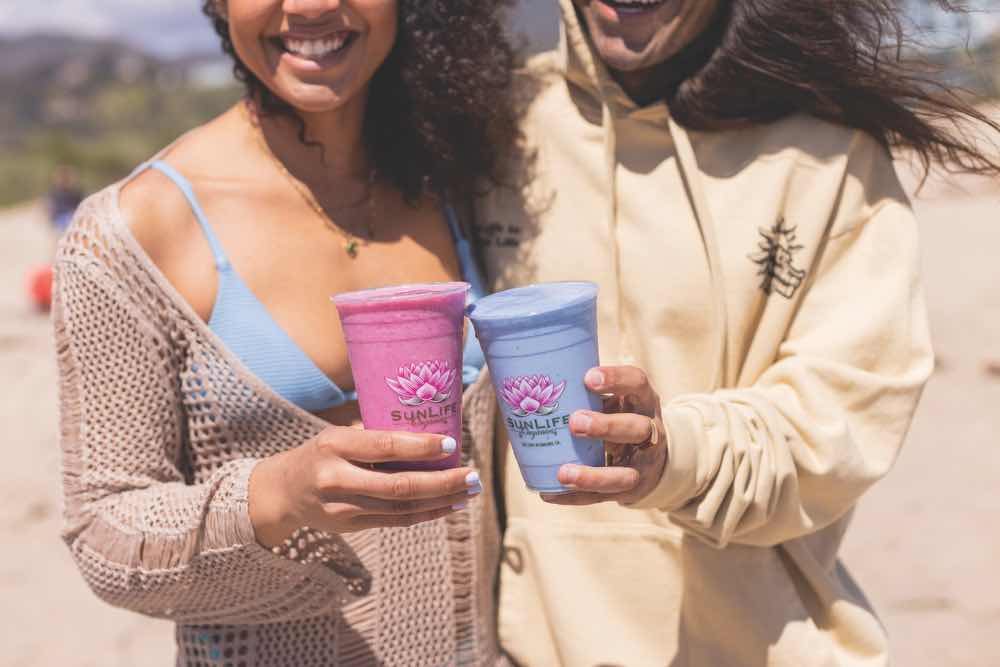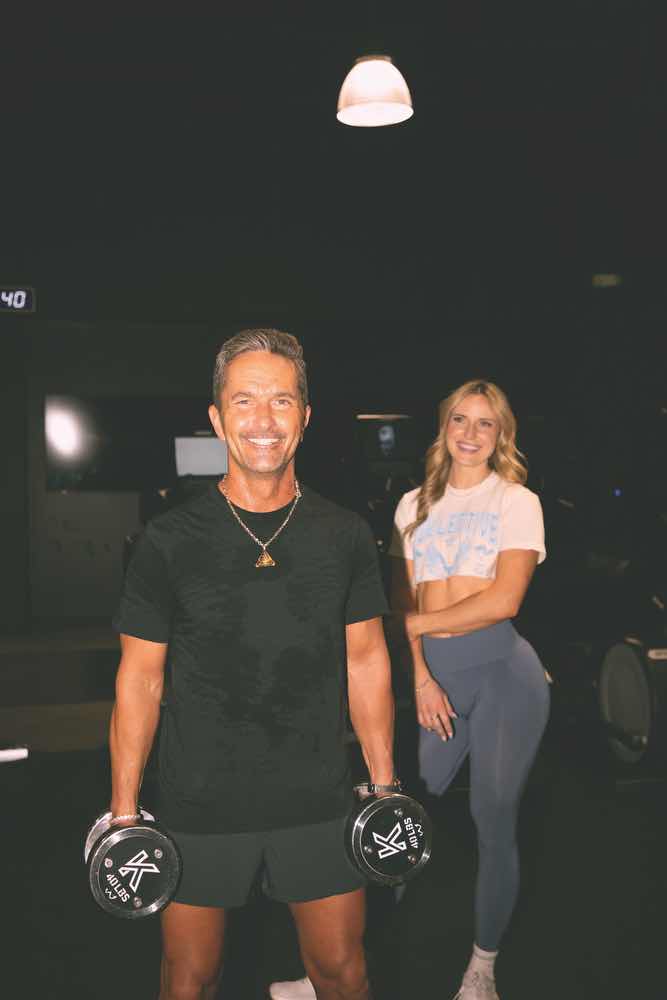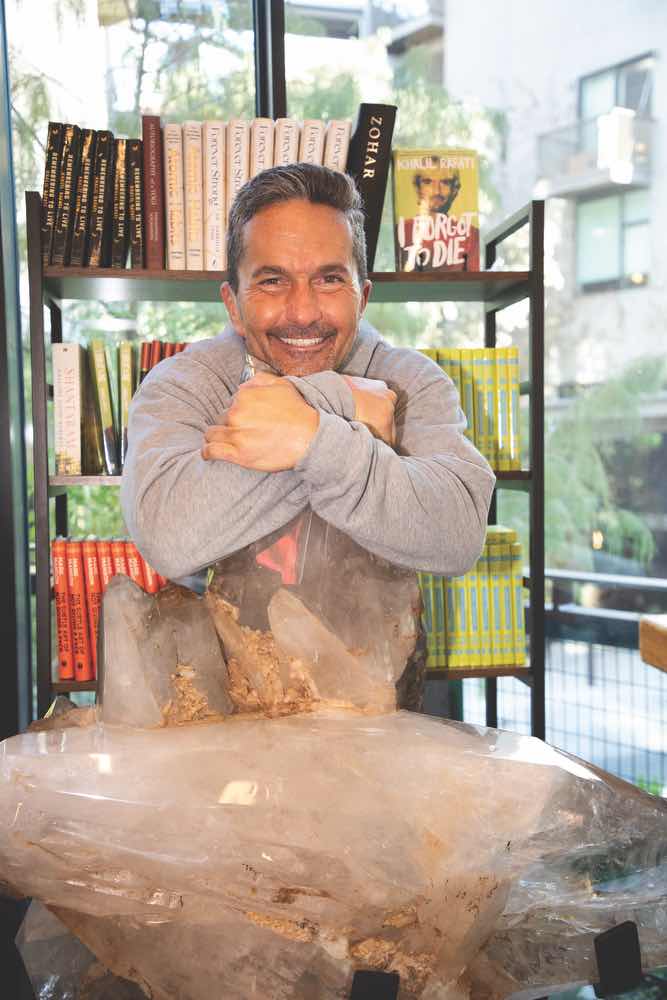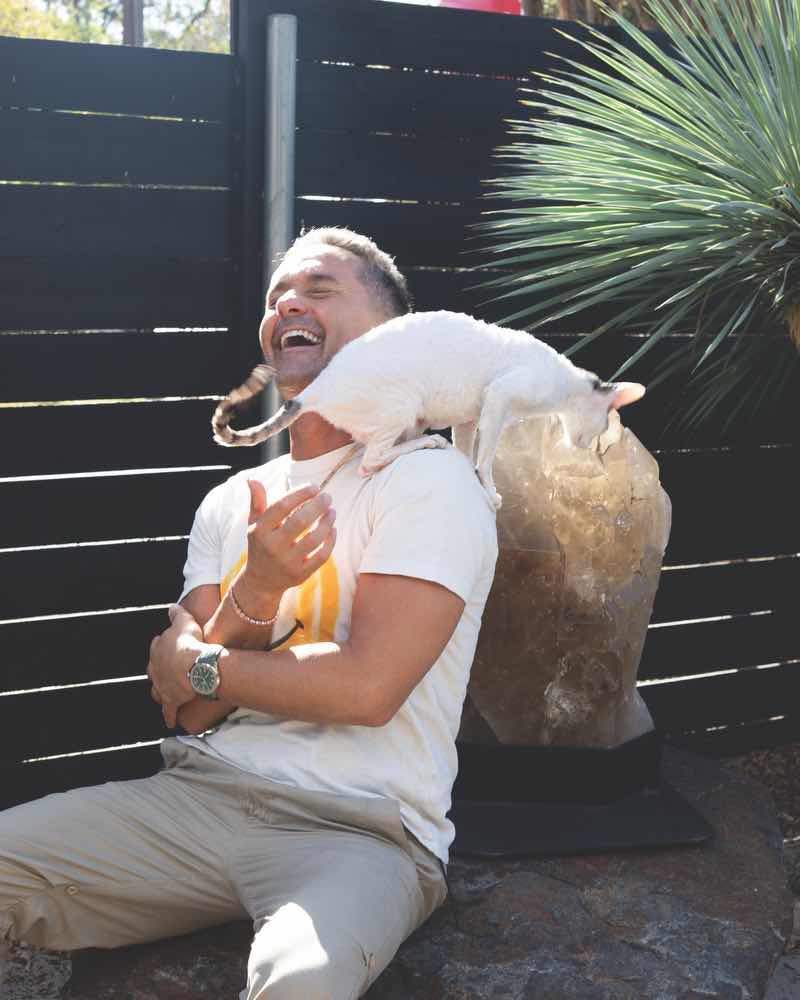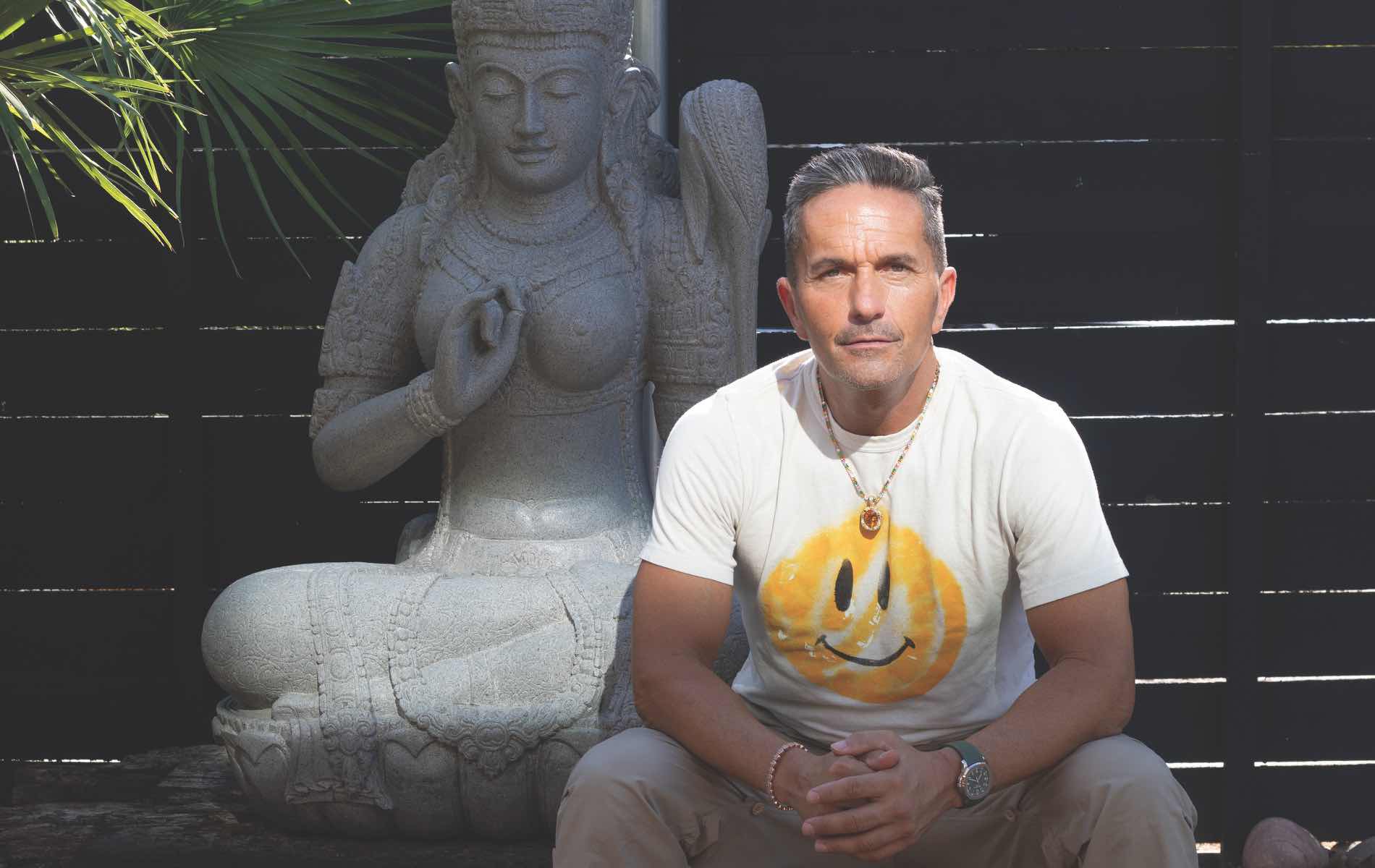
vie-magazine-sun-life-organics-hero
The Essence of the Lotus Flower
January 2025
Khalil Rafati’s Inspiring Journey
By Hailey Bethke | Photography by Luisa Pineda and Bénédicte Castillo
The lotus flower is said to represent strength and overcoming adversity. From its fixed position deeply rooted in the mud, it is proof that beauty can exist in even the most unforgiving environments. It makes sense this flower is the emblem of SunLife Organics; it mirrors founder Khalil Rafati’s inspiring journey from drug addict to entrepreneur. Despite a childhood of trauma and abuse and years of homelessness and addiction, Rafati leaned into radical responsibility. By persevering through the muck, he cultivated an honest relationship with God to discover what it looks like to lead a life of love.
My desire as a child was to be seen. I wanted someone to notice me and love me. I spent most of my time trying to be seen and acknowledged, and the rest was spent in nature,” Rafati begins. “Nature was the only solace I could truly find; I loved the little bunnies in the spring, the minnows in the creek, the butterflies and the birds.
He continues, “I had debilitating panic attacks and didn’t know what they were. But I was so afraid to tell anybody. Back then, they would put people who went ‘crazy’ in a rubber room in a straitjacket. That was a huge fear of mine: that I would get locked up if I told anyone how I felt. I would just be sitting in class or sometimes doing nothing at all, and I could feel my heart beating out of my chest; thoughts would echo in my brain. I developed severe coping mechanisms like biting my hand really hard or hiding under blankets. But, I would also go into the woods, especially in rural Ohio after a fresh fallen snow. Being in the forest brought me comfort and shelter from the storm of life.”
Seeking the love and attention he never received during his childhood, Rafati moved to Los Angeles at age twenty-one in pursuit of fame. A short stint in the music industry quickly transformed into a severe drug addiction that left him homeless and misguided. When asked what his ultimate turning point was to know himself—without striving or seeking external validation—he says, “It was in the wreckage of the past, and certainly in sobriety at thirty-three years old, and in a place I was so unfamiliar with: humility.”
He explains, “Humility did not come through virtue. It came through extreme and almost unbearable pain. In my early thirties, after bottoming out and sobering up, I had nothing. I had no family. It was in that isolation and pain that I found humility, and I reached out to God and asked for help. I got on my knees and asked for help, which is what they taught us in Catholic grade school. I began to feel levity in my spirit. I was doing a lot of menial jobs because I couldn’t get a ‘real job,’ being a convicted felon and high-school dropout. I had nothing at all. I was essentially a beggar, staying at my sponsor’s house. I had to ask for help daily. It’s hard to have an ego when you have nothing. I was praying and meditating at that time, and in that stillness, I could connect with myself through the power and grace of a living and loving God.”
One of Rafati’s jobs during his recovery was a dog walker. On these daily sojourns with two energetic black Labs, he cemented a daily practice he still implements today: a walking gratitude list. “I was recently listening to someone talk about this book that discussed the habits of the greatest revolutionary thinkers of all time. And over 90 percent of them walked daily,” he shares. “Walking is a form of meditation. I still do it today. Most days, or if I’m in pain, I just go walk. And as I walk, I say, ‘Thank you, God. Thank you for this clean water, for the roof over my head.’
I hate to sound religious or spiritual because I don’t consider myself to be either of those things, but I have this incredible relationship with our Creator. I’m a simple, uneducated man who’s just very passionate and excited about life because I was blessed with the gift of bottoming out. I was able to go within and begin the arduous journey of figuring out who I am and what I want to do. If you want to find God, all you have to do is go serve people. Go feed people. Go help people. That’s finding God on steroids.
Twelve-step meetings were another key part of Rafati’s recovery journey. “Some of my friends were criticizing me and saying I was being brainwashed in those sessions. Then the thought dawned on me: I needed to be brainwashed,” he explains. “My thoughts were filthy. They were self-defeating, self-loathing, and hypercritical of everyone and everything. I realized I needed to put good thoughts in, like we need to drink food and water to survive. Like a good addict, I grabbed onto anything and everything positive and uplifting. If I wasn’t reading As a Man Thinketh, The Power of Kabbalah, or Think and Grow Rich, I would be listening to Power vs. Force and Healing and Recovery by Dr. David Hawkins and watching The Secret. There was a period of probably eighteen months where I didn’t allow myself to think; I was just absorbing this positive information.”
Amid “reprogramming” himself in the early days of recovery, Rafati says, “I stumbled upon the knowledge that I needed to give myself permission to dream again. I had stopped dreaming long ago. I had a lot of help getting that dreamer quality beaten out of me by the school system, society, and myself with the drugs and alcohol.
When I allowed myself to dream again, that’s when the magic happened.”
SunLife Organics was the result of Rafati’s big dreams, with a mission to provide the gift of vitality through the highest-quality smoothies and juices. And if you’ve ever been to a SunLife location, you understand the magic. Rafati and the team have sourced the most potent ingredients from around the globe. Each ingredient is intentionally selected for vitality and nourishment, from whey protein sourced from a small farm in New Zealand to ceremonial matcha from the Kagoshima Prefecture of Japan.
The brand’s original location in Malibu, California, still exists today, with several other storefronts spanning the US from Austin, Texas, to Miami, Florida. Over the next year, SunLife plans to open in New York City, Boulder, Brentwood, Del Mar, West Palm Beach, and Nashville. “Landlords are finally getting it. We’re not a smoothie shop; we’re a lifestyle brand,” Rafati tells me. “People don’t just come once. They come multiple times, sometimes multiple times a day.”
One of Rafati’s favorite parts of the business has been developing SunLife products like the Greens Powder, Protein Powders, Hydration & Beauty glow sticks, and Dawn Patrol coffee blend. The Hydration & Beauty glow sticks are a routine favorite he consumes “every day, all day.” Ingredients like hyaluronic acid and silica leave your skin glowing and hydrated from the inside out. “The Apex greens powder also tastes amazing and lists all the ingredients we use without the misleading ‘proprietary formula,’ marketing nonsense,” he says.
I had a great idea, but I didn’t create SunLife Organics. The idea existed in the ethers, the fairy-tale space of creativity and God. I just scrubbed the vessel, prayed, and found stillness enough to receive that idea. SunLife Organics was placed into my hands,” he expresses. “I am just the conduit—the connector between the ethereal and the concrete world. That was a heavy realization. The first five years, I pounded my chest, saying ‘Look at me! Look at what I created!’ I didn’t create anything. I just received it.
Reflecting on his journey, Rafati acknowledges how his relationship with God and the courage to dream again completely shifted his reality. “I’m still an addict; I just changed my focus and changed the ingredients,” he explains. “If you knew the amount of supplements and cold plunging and sauna and crystals and beef tallow skin-care I use on a daily basis—I’m a lunatic,” he says with a laugh. “The goal of an addict is always going to be to do more and get more to feel good. I wish I had known long ago that the greatest joy you’ll ever feel is serving others.”
He continues, “It’s like a cosmic joke. My whole life, I was a desperate, broken little boy seeking female attention and shiny things. But in reality, all I had to do was humble myself, go within, ask God for help, and find a vocation where I could serve. Then, all of a sudden, my dreams were going to come true.”
SunLife Organics is undoubtedly part of Rafati’s greater legacy and a path he helped pave for dreamers. It’s proof that you’re never too late and forgiveness is always available. Creating a kinder world begins with being kind to yourself.
— V —
To connect with Khalil Rafati and the team at SunLife Organics, follow along on Instagram @khalilrafati and @sunlifeorganics, and visit SunLifeOrganics.com to find a location near you.
Rapid-Fire Questions with Khalil Rafati
What’s your favorite SunLife product?
The Wolverine smoothie. I add vanilla whey protein to it. It’s what nursed me back to life and took me from a 109-pound walking corpse to a 170-pound athlete at 55 years old. That’s the smoothie that did it. The royal jelly, bee pollen, the maca, raw cacao, almond butter, dates—everything in there is so satiating and nourishing.
Favorite superfoods?
My top three would be:
- Shilajit from Manna Vitality
- Life Cykel Mushrooms
- MASA Beef Tallow Tortilla Chips
Something “trendy” you can’t stand?
“Fake healthy.” I can’t stand places that look like they’re healthy and talk like they’re healthy but use statements like “We use organic whenever possible.” It’s the United States of America—it’s always possible to use organic products unless you live in Alaska. “Fake healthy” is trending hard right now. A lot of food service places are teeming with insecticides and seed oils but have lines out the door because they hired a brand expert and are very Instagrammable.
What’s an undervalued quality that you wish more people would embody?
Kindness.
What’s your favorite coffee drink?
SunLife Organics Dawn Patrol
— V —
Share This Story!
KEEP UP WITH THE LATEST STORIES FROM VIE



